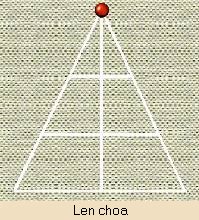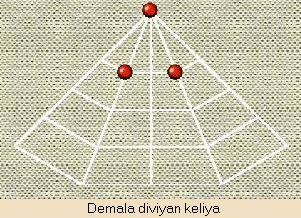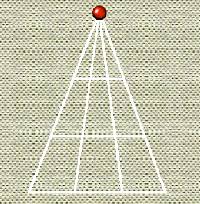

Introduction
Leopard games are traditional games from Asia with a long history. These are quite attractive hunt-games which are played on triangular boards. The Tiger side plays with one or several Tiger pieces. The White side plays with 5-15 Leopards (also known as ‘dogs’ or ‘lambs’). The Leopards must all be dropped before they are moved. Pieces move by sliding along a line to an adjacent vacant point. The Tiger may also capture a Leopard by jumping over it as in checkers, but only a single Leopard may be taken each turn. Capture is not mandatory. The Leopards win if the Tiger(s) are immobilized so they(he) can’t move. The Tiger wins if he reduces the Leopards to zero, four, or eight, depending on variant.
Discussion
Murray (1952) categorizes this form of hunt-game as Leopard games. They are played on triangular boards and sometimes the pieces are called ‘leopards,’ sometimes ‘lambs’ or ‘dogs.’ The capturing piece is always called ‘tiger.’ Pieces are often said to be ‘chopped’ when captured.
Pulijudam (Hindustani), ‘the tiger game’ (above), is a popular game played in all parts of India. It is definitely not easy. Perhaps some positions are unsolvable for the Leopards, but generally they win. The Tiger side plays with 3 Tiger pieces, initially positioned as in the above image. The white side plays with 15 Leopards (also known as ‘lambs’). The Leopards must all be dropped on the board, one by one, before they are moved. Pieces move by sliding along a line to an adjacent vacant point. The Tiger may also kill a Leopard by jumping over it as in checkers, but only a single Leopard may be taken each turn. The Leopards win if the Tiger is immobilized so he can’t move. The Tiger wins if he reduces the Leopards to 8. This game is also called Adu Puli Atam and Adu Huli.
Len choa (below) originates from Thailand and is a simple game of which I provide two versions: one with 6 Leopards and one with 5 Leopards. As extant single-Tiger Leopard games are somewhat easy I provide two additional single-Tiger Leopard games that I’ve invented myself and that are tougher nuts to crack (the bottommost images).

Demala diviyan keliya, ‘the Tamil leopards game’ (below) derives from Sri Lanka. In India it is called Rafãya. It is easier than Pulijudam. The game is described by Parker (1909). The rules are the same as Pulijudam. Note that Murray, who uses Parker as only source, gives an erroneous account of the board diagram for this game. He misunderstands it as a form of Pulijudam board with extended arms. This does not work; I’ve tested it. The correct version works quite well, however.


Six dogs

Seven dogs
References
Parker, H. (1909). Ancient Ceylon – An Account of the Aborigines and of Part of the Early Civilisation. London: Luzac & Co. Publishers.
Murray, HJR (1952). A History of Board-Games other than Chess’, 1952. Oxford: Oxford University Press.
☛ You can download my free ‘Asian Leopard games’ program here (updated 2007-05-03), but you must own the software Zillions of Games to be able to run it. (I recommend the download version.)
© Mats Winther 2005